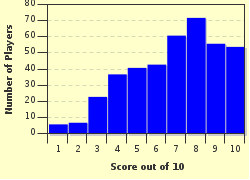Quiz Answer Key and Fun Facts
1. Starting at the beginning, what does Cohen mean?
2. Who was the original Cohen?
3. Which relative can pass on the Cohen line to the current generation?
4. Which is *not* a Jewish version of the surname Cohen?
5. Which tribe are the helpers of the Cohanim?
6. Which of these activities is a Cohen not normally barred from doing?
7. Following the previous question, would it be allowed for a Cohen to remarry his own wife following a divorce?
8. What event reduced the duties of Cohanim in the field of religion?
9. Cohanim have a genetic link.
10. One feature of a Cohen is their honour of primacy, meaning they have first option in various situations among other Jews. Which of these is *not* written as one of them?
Source: Author
satguru
This quiz was reviewed by FunTrivia editor
LeoDaVinci before going online.
Any errors found in FunTrivia content are routinely corrected through our feedback system.


